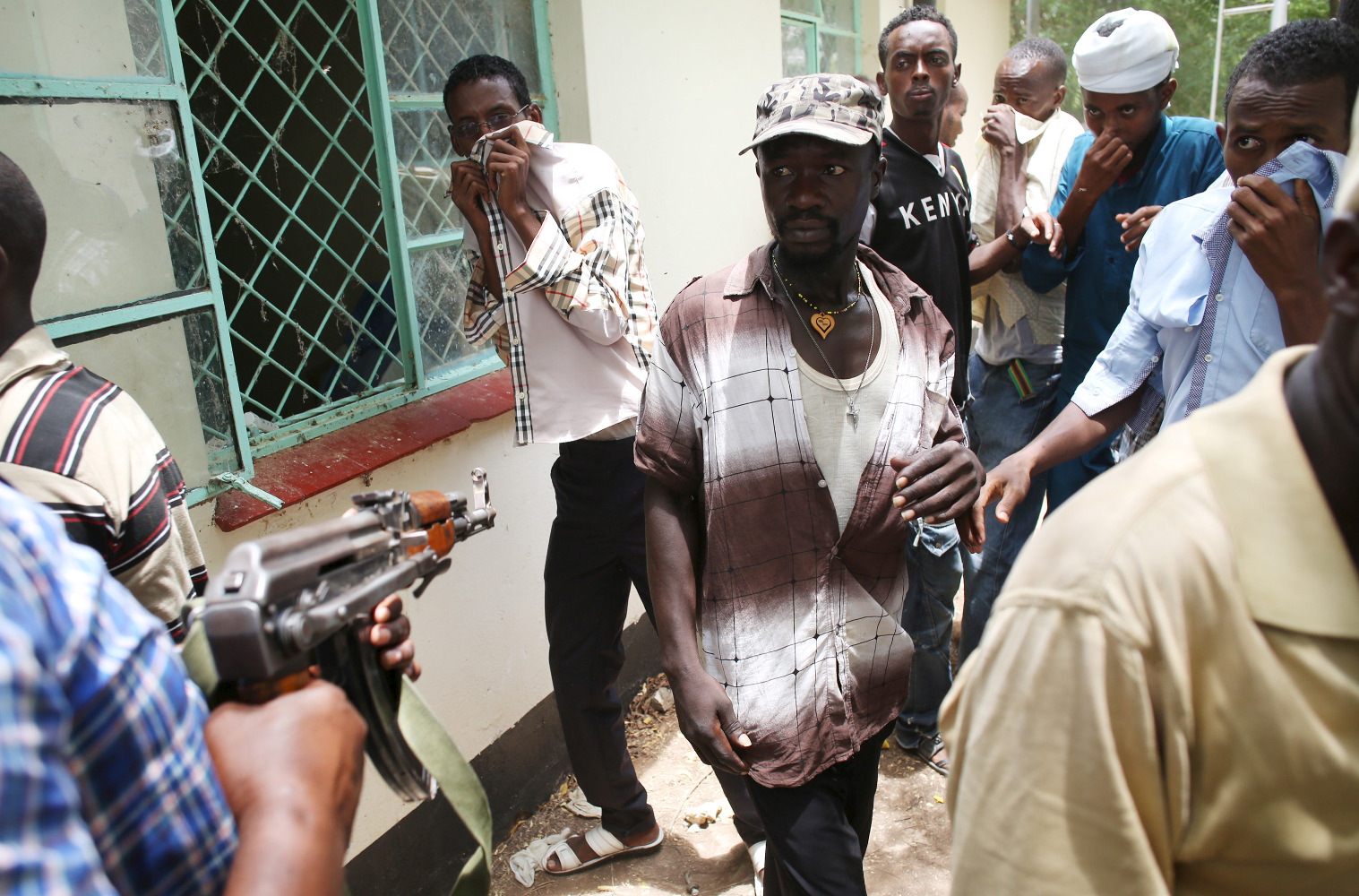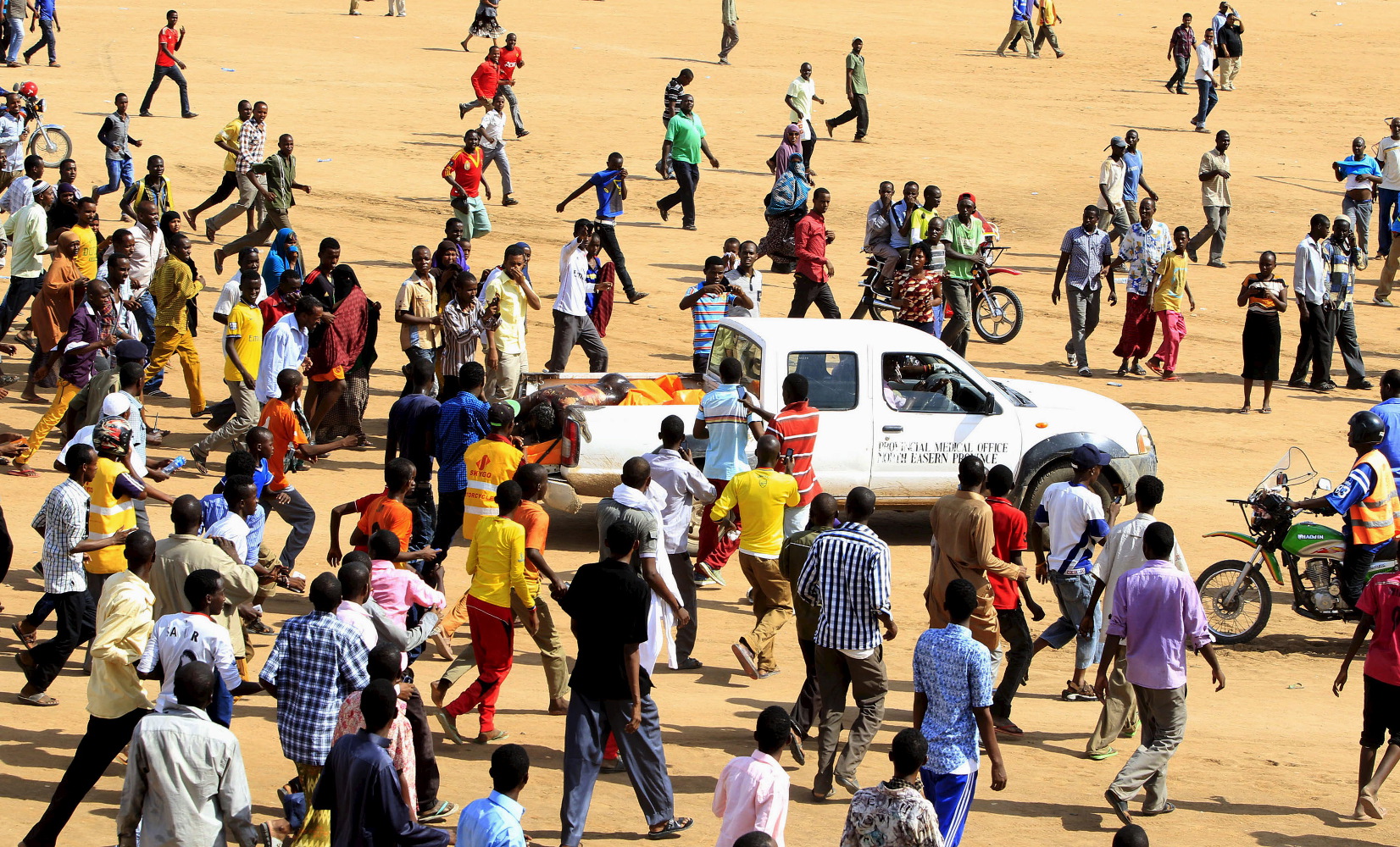A relative is assisted by Kenya Red Cross staff as she reacts where bodies of the students killed at a university in Garassi.
In the now quiet grounds where Islamist gunmen massacred more than 140 people last week, police and soldiers stand under the shade of trees, where students once sat studying or chatting with friends.
Al-Shabab gunmen launched the pre-dawn attack in Garissa, storming dormitory buildings before lining up non-Muslim students for execution in what Kenyatta described as a “barbaric medieval slaughter”.
Papers and pens lie in the dust, apparently dropped by students as they fled when gunmen from Somalia’s al-Qaeda-linked al-Shabab launched their killing spree, hurling grenades and firing automatic rifles.
The massacre in Garissa, Kenya’s deadliest attack since the 1998 bombing of the United States embassy in Nairobi, claimed the lives of 142 students, three police officers and three soldiers.
On Monday, four days since the day-long violence spree, journalists were briefly allowed for the first time into the campus.

A policeman points his gun as he tries to push back people who came to see the bodies of suspected Garissa University College attackers in a morgue.
The bullet-scarred buildings remained closed, but peering through the doors and windows, a sense of the carnage and the fury of the violence was clear.
At the three-storey Elgon A hostel, where the worst killings took place, shards of glass from the doors smashed by bullets cover the entrance.
Inside, where the gunmen gathered students together before carrying out their day of slaughter, dark stains of blood cover the floors, showing the magnitude of the massacre.
Scraps of flesh
Reuben Nyaora, a clinical officer working for the aid agency International Rescue Committee (IRC), and one of the first frontline medics into the halls, described seeing “bodies everywhere in execution lines … people whose heads had been blown off, bullet wounds everywhere, it was a grisly mess.”
Now the rooms are empty, but in places the blood is smeared in long lines, suggesting where a wounded student crawled away in agony in a desperate effort to escape.
Belongings of the students still lie around: a single shoe, a pair of sandals, torn and bloody clothes, some books.
Survivors described scenes of total carnage: piles of bodies and pools of blood running down the corridors as laughing gunmen taunted their victims.
Nyaora described how he witnessed three women apparently dead, covered head to toe entirely in blood but in fact physically unharmed, pick themselves up from a pile of corpses.

Morgue workers drive bodies of suspected Garissa University College attackers
They told him how gunmen ordered them to “swim in the blood”, as though they were making fun of them, playing games and apparently enjoying the killing.
Local government commissioner Njega Miir, who stopped journalists taking photographs from inside the halls as a mark of respect to the dead, said buildings would remain locked, and the property of the students left sent on to survivors.
“We have secured all doors to all buildings in the college to ensure that, items left behind by the students remain safe, and delivered to their respective owners,” he said.
The university has been ordered to close permanently.
Around the compound, evidence remains of the desperation the students felt, as those that could fled the killing.
Snagged on the barbed wire fence around the campus are scraps of flesh, hair and small rags of cloth – ripped off the students as they escaped.
Kenya warplanes strike Shabab camps in Somalia
Kenyan fighter jets on Monday bombed two camps of the al-Shabab insurgents in southern Somalia, the army said.
“We bombed two al-Shabab camps in the Gedo region,” Kenyan army spokesperson David Obonyo told Agence France-Presse.
“The two targets were hit and taken out, the two camps are destroyed.”
The airstrikes follow threats by President Uhuru Kenyatta that he would retaliate “in the severest way possible” against the Shabab militants for their attack last Thursday on the university.
There was no information given as to casualties in the bases hit. – AFP